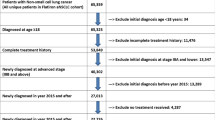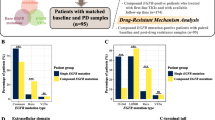Abstract
Background
De novo epidermal growth factor receptor (EGFR) resistance mutations in tyrosine kinase inhibitor-naïve patients are rare when assessed by standard genotyping methods.
Methods
Patients with EGFR mutations were identified using PCR-based fragment length analysis, mass spectrometry-based genotyping (Sequenom), and Sanger sequencing.
Results
From 2008 to 2015, we observed de novo EGFR resistance mutations in 12.8 patients who received an EGFR TKI with an overall response rate of 25%, median PFS 24 months, and median OS 34 months. Five patients (63%) received erlotinib in the first-line setting with a 60% disease control rate (DCR) and a median duration of response of 6 months (range 4–45 months). Three (37%) received cytotoxic chemotherapy in the first-line setting with 67% DCR and a median duration of response of 11 months (range 10–12 months). In patients with de novo EGFR T790M mutations, 50% (2/4) had stable disease with one patient having an ongoing response to erlotinib of over 96 months. In patients with de novo EGFR S768I mutations who received erlotinib, 50% (2/4) have ongoing partial responses at 30 and 6 months.
Conclusion
This is the largest Irish review of de novo synchronous EGFR mutations. The incidence of co-occurring EGFR mutations in our cohort of non-small cell lung carcinoma (NSCLCA) is 1% on routine assays. Erlotinib appears to have activity in this cohort in both in the first- and second-line setting. De novo S768I and T790M represent distinct clinical entities. For de novo T790M mutations cytotoxic chemotherapy may still be considered first line. For de novo S768I mutations, erlotinib appears to be a reasonable therapeutic option.
Similar content being viewed by others
References
Jemal A, Siegel R, Xu J et al (2010) Cancer statistics, 2010. CA Cancer J Clin 60:277–300 CrossRef, Medline
Lee CK, Brown C, Gralla RJ et al (2013) Impact of EGFR inhibitor in non-small cell lung cancer on progression-free and overall survival: a meta-analysis. J Natl Cancer Inst 105:595
Zhou C, Wu YL, Chen G et al (2011) Erlotinib versus chemotherapy as first-line treatment for patients with advanced EGFR mutation-positive non-small-cell lung cancer (OPTIMAL, CTONG-0802): a multicentre, open-label, randomised, phase 3 study. Lancet Oncol 12:735
Moran T, Sequist LV (2012) Timing of epidermal growth factor receptor tyrosine kinase inhibitor therapy in patients with lung cancer with EGFR mutations. J Clin Oncol 30:3330
Zhang Y, Wang Z, Hao X, Hu X, Wang H, Wang Y, Ying J (2017) Clinical characteristics and response to tyrosine kinase inhibitors of patients with non-small cell lung cancer harboring uncommon epidermal growth factor receptor mutations. Chin J Cancer Res 29(1):18–24. https://doi.org/10.21147/j.issn.1000-9604.2017.01.03
Kelly D, Mc Sorley L, O’Shea E et al. (2017) A regional analysis of epidermal growth factor receptor (EGFR) mutated lung cancer for HSE South. Ir J Med Sci 9. https://doi.org/10.1007/s11845-017-15
Author information
Authors and Affiliations
Corresponding author
Ethics declarations
Conflict of interest
This manuscript is in compliance with Committee on Publication Ethics and the authors have no conflict of interest to disclose.
Rights and permissions
About this article
Cite this article
Kelly, D., Burke, L., O’Brien, C. et al. Co-occurrence of EGFR sensitising and resistance mutations at diagnosis in NSCLC. Ir J Med Sci 188, 405–408 (2019). https://doi.org/10.1007/s11845-018-1868-0
Received:
Accepted:
Published:
Issue Date:
DOI: https://doi.org/10.1007/s11845-018-1868-0




